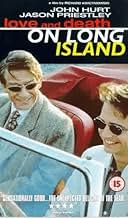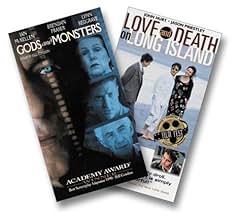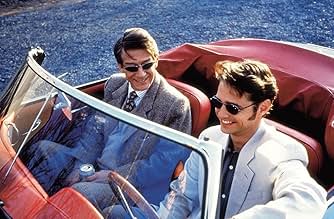VALUTAZIONE IMDb
6,9/10
4271
LA TUA VALUTAZIONE
A Londra Giles De'Ath, compassato scrittore inglese, vede per caso una commedia hollywoodiana e viene preso da un'inattesa passione amorosa, tutta di testa, per uno degli interpreti.A Londra Giles De'Ath, compassato scrittore inglese, vede per caso una commedia hollywoodiana e viene preso da un'inattesa passione amorosa, tutta di testa, per uno degli interpreti.A Londra Giles De'Ath, compassato scrittore inglese, vede per caso una commedia hollywoodiana e viene preso da un'inattesa passione amorosa, tutta di testa, per uno degli interpreti.
- Regia
- Sceneggiatura
- Star
- Ha vinto 1 BAFTA Award
- 4 vittorie e 4 candidature totali
Danny Webb
- Video Assistant
- (as Daniel Webb)
Dean Gatiss
- Rob
- (as Dean Gariss)
Recensioni in evidenza
Locked out of his apartment, old-fashioned writer Giles De'Ath (John Hurt) almost reluctantly decides to take in a movie. Accidentally wandering in to see Hot Pants College II instead of the E.M. Forster adaptation for which he bought a ticket, the lonely man becomes transfixed by the sight of a hunky actor (Jason Priestley) and begins an obsession that makes for a thoroughly satisfying and entertaining story. First-time director Kwietniowski expertly observes the wildly disparate natures of these two men while keeping both of them entirely credible and believable. I particularly enjoyed Giles' compilation of Ronnie Bostock clippings from teeny-bopper magazines, carefully arranged and titled "Bostockiana" before being securely locked away in a desk drawer.
"Do you own a word processor?"
"I WRITE. I do not PROCESS words."
Giles De'Ath is a frail man on the verge of suffocating on high 19th century culture: he is sheltered within cafes, cigars, E.M. Forster, and presentations of lectures like "The Death of the Future." As one radio commentator asks him, "Does the 20th century play ANY part in your life?"
Giles is utterly changed by witnessing truly LOW culture on the big screen, the film Hotpants College II that he mistakes for E.M. Forster's Eternal Moment. Upon going for a second viewing, Giles is ashamed of even saying the name of the movie at first. He is mesmerized by the image of one Ronnie Bostock, Mikey in the film, a waiter who gets pushed around and finally shoved onto a restaurant counter and covered with ketchup, making Mikey a Christlike martyr for the Porky's generation. When the movie fades to black and the end credits come up, the name RONNIE BOSTOCK literally shines through the eyes of Giles De'Ath. So begins Giles' reluctant but determined search for this Bostock. He's seen all Ronnie's films and is transfixed by his image (indeed, Ronnie's movies are the first thing he's ever seen on a TV or a film screen.)
The second act of the movie takes Mr. De'Ath to Chesterton, Long Island- the home of Ronnie Bostock. De'Ath learns little by little about the modern American culture as he amusingly stalks his way into Ronnie's home. He offers his devotion to the career of Ronnie Bostock, who has decided he wants to be taken seriously as an actor.
Giles introduces him to an idea for a movie: a deaf-mute who has never been outside in the real world, who in fantasy is surrounded only by white, empty space, has in his possession a television to look outwards. After enough images, this childlike deaf-mute wants to experience the real world and must do it through fulfilling the quest of falling in love.
Bostock loves the idea, but he just doesn't GET it about Giles. That's DE'ATH's story. (It's strange when seeing the vision of Priestley in that script. I found myself wondering the effect of Teletubbies upon children, who may be both deaf and mute in certain ways and learn how to reach out towards reality through surreal television images. It's both troubling and poignant...)
Giles De'Ath is in love with the image of Ronnie Bostock: regardless of how low his movies are, Ronnie has a "file of smiles" for different emotions, "a permanence" in his look. His martyred state on the counter resembles old paintings. His film work is what Shakespeare would have done as both his comedies and Hotpants College 2 were made "for the rabble in the pit."
However, Giles, somewhere along the way, realizes that he is ALSO "completely, desperately" in love with Ronnie Bostock.
I won't give away the ending. The film is low-budget, short, and it has basically only two developed characters. It doesn't have much of an effect afterwards, but it has real poetry to it, especially in Hurt's transformation from high culture shelter to low culture inspiration. I'm still not sure if this is a high-culture indie making fun of low culture, or a low culture movie trying to justify itself, as Giles tries to do for Ronnie. One reason I hated Boogie Nights, among many, is that it wanted us to sympathize with Mark Wahlberg's porn star but also allowed us to distance ourselves from him and laugh AT him anytime we wanted: that's cheating. This film gets it right- it's not sarcastic about Ronnie's work, though certainly we have reasons to laugh at it. We have to draw our own conclusions about these characters, about the LOVE we see that Giles has for the star. Is this REAL love, or is it even more than that?
I'm a lover of film, and there are images that I see that I will pause, and play in slow motion, especially now with quicktime clips on the Mac: the poetry of a certain face, like that of Jodhi May(Alice) in Last of the Mohicans right before she jumps off the cliff. There's a love there for her, for her image, that is indescribable for me, so I can appreciate and truly relish the story of a man enamored by an image.
I'm also always glad to see a film about a man who finds inspiration in modernity. We know by the end that Giles is entering a new kind of life: perhaps "The De'Ath of the Future" is somebody who accepts all culture. He sees the low in the high and the high in the low, and he makes no distinction between the "art" of images in the art gallery and those of your everyday teen flick.
"I WRITE. I do not PROCESS words."
Giles De'Ath is a frail man on the verge of suffocating on high 19th century culture: he is sheltered within cafes, cigars, E.M. Forster, and presentations of lectures like "The Death of the Future." As one radio commentator asks him, "Does the 20th century play ANY part in your life?"
Giles is utterly changed by witnessing truly LOW culture on the big screen, the film Hotpants College II that he mistakes for E.M. Forster's Eternal Moment. Upon going for a second viewing, Giles is ashamed of even saying the name of the movie at first. He is mesmerized by the image of one Ronnie Bostock, Mikey in the film, a waiter who gets pushed around and finally shoved onto a restaurant counter and covered with ketchup, making Mikey a Christlike martyr for the Porky's generation. When the movie fades to black and the end credits come up, the name RONNIE BOSTOCK literally shines through the eyes of Giles De'Ath. So begins Giles' reluctant but determined search for this Bostock. He's seen all Ronnie's films and is transfixed by his image (indeed, Ronnie's movies are the first thing he's ever seen on a TV or a film screen.)
The second act of the movie takes Mr. De'Ath to Chesterton, Long Island- the home of Ronnie Bostock. De'Ath learns little by little about the modern American culture as he amusingly stalks his way into Ronnie's home. He offers his devotion to the career of Ronnie Bostock, who has decided he wants to be taken seriously as an actor.
Giles introduces him to an idea for a movie: a deaf-mute who has never been outside in the real world, who in fantasy is surrounded only by white, empty space, has in his possession a television to look outwards. After enough images, this childlike deaf-mute wants to experience the real world and must do it through fulfilling the quest of falling in love.
Bostock loves the idea, but he just doesn't GET it about Giles. That's DE'ATH's story. (It's strange when seeing the vision of Priestley in that script. I found myself wondering the effect of Teletubbies upon children, who may be both deaf and mute in certain ways and learn how to reach out towards reality through surreal television images. It's both troubling and poignant...)
Giles De'Ath is in love with the image of Ronnie Bostock: regardless of how low his movies are, Ronnie has a "file of smiles" for different emotions, "a permanence" in his look. His martyred state on the counter resembles old paintings. His film work is what Shakespeare would have done as both his comedies and Hotpants College 2 were made "for the rabble in the pit."
However, Giles, somewhere along the way, realizes that he is ALSO "completely, desperately" in love with Ronnie Bostock.
I won't give away the ending. The film is low-budget, short, and it has basically only two developed characters. It doesn't have much of an effect afterwards, but it has real poetry to it, especially in Hurt's transformation from high culture shelter to low culture inspiration. I'm still not sure if this is a high-culture indie making fun of low culture, or a low culture movie trying to justify itself, as Giles tries to do for Ronnie. One reason I hated Boogie Nights, among many, is that it wanted us to sympathize with Mark Wahlberg's porn star but also allowed us to distance ourselves from him and laugh AT him anytime we wanted: that's cheating. This film gets it right- it's not sarcastic about Ronnie's work, though certainly we have reasons to laugh at it. We have to draw our own conclusions about these characters, about the LOVE we see that Giles has for the star. Is this REAL love, or is it even more than that?
I'm a lover of film, and there are images that I see that I will pause, and play in slow motion, especially now with quicktime clips on the Mac: the poetry of a certain face, like that of Jodhi May(Alice) in Last of the Mohicans right before she jumps off the cliff. There's a love there for her, for her image, that is indescribable for me, so I can appreciate and truly relish the story of a man enamored by an image.
I'm also always glad to see a film about a man who finds inspiration in modernity. We know by the end that Giles is entering a new kind of life: perhaps "The De'Ath of the Future" is somebody who accepts all culture. He sees the low in the high and the high in the low, and he makes no distinction between the "art" of images in the art gallery and those of your everyday teen flick.
John Hurt just doesn't get the credit he deserves, I think. He's a consistently great actor who often adds so much more to a film than many other bigger names would. This film is a prime example of him taking a role and truly making it his own.
Hurt plays Giles De'Ath, a most formal English author who, as a radio interviewer puts it, doesn't have much use for the 20th century. He would have even less use for a movie named 'Hotpants College II,' except that when he accidentally happens to view it, he's struck like a thunderbolt by the vision of an actor on the screen, Ronnie Bostock, played by Jason Priestly. From that moment on, De'Ath comes to life in his obsession for the young man and his elaborate plans to meet him. Having been taken care of by a housekeeper these many years, De'Ath struggles with the most ordinary tasks as he lives out his obsession. He buys teenage girls' magazines at the newsstand and furtively disposes of them lest anyone find out his secret. He purchases a videocassette recorder to watch Ronnie's films, not realizing that a television is also necessary for their viewing. Then when he goes to Bostock's home town on Long Island in hopes of tracking him down, he's almost like The Man Who Fell to Earth, being alone in such an alien culture. His behavior is as obsessive as any stalker, but he must be the most genteel stalker there ever was.
Watching Hurt go through this routine during the movie's first half is so fascinating and so entertaining that the film actually hits a bit of a stall when he finally does meets the object of his desire, but it rights itself quickly and comes to a nice conclusion. Some might hope for a more wildly dramatic ending, but I was satisfied.
Jason Priestly does a fine job here in what is basically a thankless role, in that by this film's nature, he's constantly upstaged by Hurt's performance, like Othello is by Iago, or Nick Nolte was by Eddie Murphy in '48 HRS.,' if that's not too jolting of a comparison. I found it fascinating, what some might call a "little" film except that it displays some large talents.
Hurt plays Giles De'Ath, a most formal English author who, as a radio interviewer puts it, doesn't have much use for the 20th century. He would have even less use for a movie named 'Hotpants College II,' except that when he accidentally happens to view it, he's struck like a thunderbolt by the vision of an actor on the screen, Ronnie Bostock, played by Jason Priestly. From that moment on, De'Ath comes to life in his obsession for the young man and his elaborate plans to meet him. Having been taken care of by a housekeeper these many years, De'Ath struggles with the most ordinary tasks as he lives out his obsession. He buys teenage girls' magazines at the newsstand and furtively disposes of them lest anyone find out his secret. He purchases a videocassette recorder to watch Ronnie's films, not realizing that a television is also necessary for their viewing. Then when he goes to Bostock's home town on Long Island in hopes of tracking him down, he's almost like The Man Who Fell to Earth, being alone in such an alien culture. His behavior is as obsessive as any stalker, but he must be the most genteel stalker there ever was.
Watching Hurt go through this routine during the movie's first half is so fascinating and so entertaining that the film actually hits a bit of a stall when he finally does meets the object of his desire, but it rights itself quickly and comes to a nice conclusion. Some might hope for a more wildly dramatic ending, but I was satisfied.
Jason Priestly does a fine job here in what is basically a thankless role, in that by this film's nature, he's constantly upstaged by Hurt's performance, like Othello is by Iago, or Nick Nolte was by Eddie Murphy in '48 HRS.,' if that's not too jolting of a comparison. I found it fascinating, what some might call a "little" film except that it displays some large talents.
What a wonderful piece of acting John Hurt gives us as Giles a naive English writer visiting Long Isalnd for the first time. Completely obsessed with the discovery of all the modern electronic gadgetry, he purchases TV and video equipment, shuts himself away and enters a new and exciting world.
He becomes besotted with the image of a handsome young actor Ronnie Bostock (Jason Priestley) a favourite among teen-age movie-goers. It's as if he is starting a completely new life with a new warmth he has never known before.
The urge to help Ronnie in his career so that he will always be close to him is the predominant theme of the film. John Hurt's performance as the older man restraining his true feelings for a handsome young man of another generation is faultless and truly absorbing. Conversations between the two men are the highlights of the film and the confession scene extremely moving.
Ronnie Bostock's girl friend Audrey ( Fiona Loewi) is both charming and beautiful and adds a sweet touch to the story. She is responsible for bringing the writer and actor together. The story is punctuated with little episodes of wry humour brought about by people who live entirely different lives.
Altogether a very satisfying film that shows how some of us live in a cocoon unaware of the extreme joy and subsequent disappointment that lies beyond.
He becomes besotted with the image of a handsome young actor Ronnie Bostock (Jason Priestley) a favourite among teen-age movie-goers. It's as if he is starting a completely new life with a new warmth he has never known before.
The urge to help Ronnie in his career so that he will always be close to him is the predominant theme of the film. John Hurt's performance as the older man restraining his true feelings for a handsome young man of another generation is faultless and truly absorbing. Conversations between the two men are the highlights of the film and the confession scene extremely moving.
Ronnie Bostock's girl friend Audrey ( Fiona Loewi) is both charming and beautiful and adds a sweet touch to the story. She is responsible for bringing the writer and actor together. The story is punctuated with little episodes of wry humour brought about by people who live entirely different lives.
Altogether a very satisfying film that shows how some of us live in a cocoon unaware of the extreme joy and subsequent disappointment that lies beyond.
I recently re-saw this some years after my first viewing, and in spite of its humble mission and budget, it's still arresting and touching. A mere plot summary does not do justice to the excellent acting, the thoughtful details and dry British wit that bubbles throughout. I highly recommend it to anyone who cares about stories based on clever scripts, great acting and real characters... and especially if you value the stories of the closeted gays who lived among us.
I would give it a 9 or 10 if it did not provide some strange side trip details that don't add much except minutes to the consistency of the whole. Small complaint for a strong movie. Impress your friends/lovers with this one, almost no one has seen it in the States, I bet.
I would give it a 9 or 10 if it did not provide some strange side trip details that don't add much except minutes to the consistency of the whole. Small complaint for a strong movie. Impress your friends/lovers with this one, almost no one has seen it in the States, I bet.
Lo sapevi?
- QuizJohn Hurt said multiple times that he felt that this film represented his best work on film.
- BlooperWhen the mailman delivers mail to Ronnie Bostock's mailbox,he raises the mailbox flag, presumably to signal to the resident that mail has been delivered. (Ronnie's girlfriend, seeing the mailbox flag has been raised, seems to interpret the signal accordingly.) Although it may be the convention for mail delivery wherever the director/writer is from, it is not the case on Long Island, where it is the custom for the resident to raise the mailbox flag to alert the mailman that mail is in the mailbox waiting to be picked up. Once the mail has been picked up, the mailman lowers the flag - the opposite of what occurred in the film.
- Citazioni
Taxi Driver: The sign says "no smoking."
Giles De'Ath: No, the sign says "thank you for not smoking." As I am smoking, I don't expect to be thanked.
I più visti
Accedi per valutare e creare un elenco di titoli salvati per ottenere consigli personalizzati
- How long is Love and Death on Long Island?Powered by Alexa
Dettagli
Botteghino
- Lordo Stati Uniti e Canada
- 2.581.012 USD
- Fine settimana di apertura Stati Uniti e Canada
- 78.151 USD
- 8 mar 1998
- Lordo in tutto il mondo
- 2.581.012 USD
- Tempo di esecuzione1 ora 33 minuti
- Colore
- Mix di suoni
- Proporzioni
- 1.85 : 1
Contribuisci a questa pagina
Suggerisci una modifica o aggiungi i contenuti mancanti

Divario superiore
What is the English language plot outline for Amore e morte a Long Island (1997)?
Rispondi





























